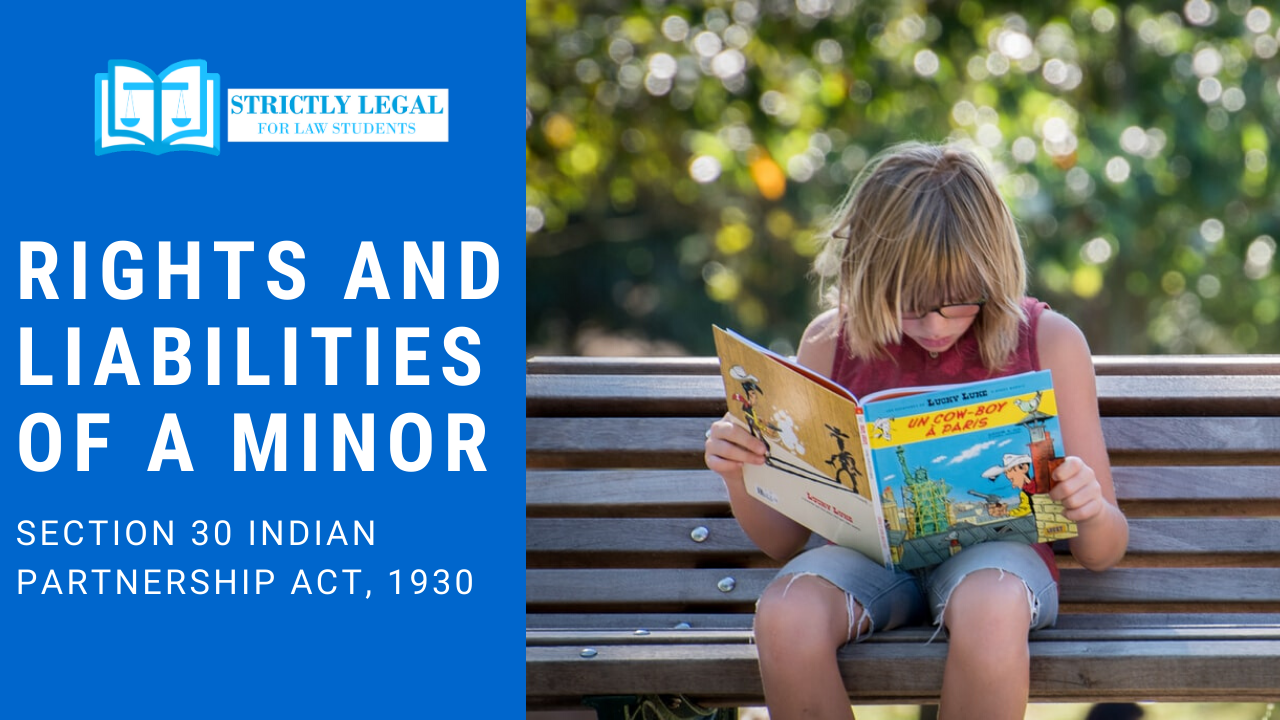In our previous blogs, we have discussed the basics of Partnership form of business, Minor’s rights, and liabilities. Here, we shall discuss the rights and duties of partners in a partnership.
Table of Contents
Mutual rights and duties of partners
The mutual relations of the partners of the firm came into existence by an agreement between the partners giving rise to mutual rights and duties of the partners.
Section 9 to section 17 of the Indian Partnership Act, 1932 lays down the provisions governing the mutual relations of the partners. These are governed by the contract existing between them which may be expressed or implied by the course of their dealings.
The contract may provide that a partner shall not carry on any business other than that of the firm while he is a partner (Section 11). Subject to a contract between them, the mutual rights and duties are as follows:
Rights of a partner in partnership
There are several rights of a partner in a partnership form of business and have been discussed below:
Right to take part in the conduct of business
This right is contained in Section 12(a).
Every partner has the right to take part in the business of the firm. This is because partnership business is a business of the partners and their management powers are generally co-extensive.
Now suppose this management power of the particular partner interfered with and he has been wrongfully precluded from participating therein. Can the Court interfere in these circumstances?
The answer is in the affirmative. The Court can and will by injunction restrain other partners from doing so.
You should also note in this connection that a partner who has been wrongfully deprived of the night of participation in the management has also other remedies eg. a suit for dissolution a suit for accounts without seeking dissolution etc
The above mentioned provisions of law will be applicable only if there is no contract to the contrary between the partners. It is quite common to find a term in partnership agreements, which gives only limited power of management to a partner or a term that the management of the partnership will remain with one or more of the partners to the exclusion of others.
In such a case, the Court will normally be unwilling to interpose with the management with such partner or partners unless it is clearly made out that something was done illegally or in breach of the trust reposed in such partners.
Right to be consulted
This right is contained in Section 12(c).
Where any difference arises between the partners with regard to the business of the firm, it shall be determined by the views of the majority of them and every partner shall have the right to express his opinion before the matter is decided.
But no change in the nature of the business of the firm can be made without the consent of all the partners. This means that in routine matters, the opinion of the majority of the partners will prevail, Of course, the majority must act bona fide in good faith and every partner must be consulted as far as practicable.
You should note that the aforesaid majority rule will not apply where there is a change in the nature of the firm itself and in such a case, the unanimous consent of the partners is needed.
Right of access to books
This right is contained in Section 12(d).
Every partner whether active or sleeping is entitled to have access to any or all of the books of the firm and to inspect and take out of copy thereof. The right must, however, be exercised Bonafide i.e in good faith.
Right to remuneration
This right is contained in Section 13(a).
No partner is entitled to receive any remuneration in addition to his share in the profits of the firm for taking part in the business of the firm.
But this rule can always be varied by an express agreement, or by a course of dealings, in which even the partner will be entitled to remuneration.
Thus a partner can claim remuneration even in the absence of a contract when such remuneration is payable under the continued usage of the firm.
In other words, where it is customary to pay remuneration to a partner for conducting the business of the firm he can claim it even in the absence of a contract for the payment of the same.
It is not uncommon for partners in actual practice to agree that a managing partner will receive over and above his share salary or commission for the trouble that he will take while conducting the business of the firm.
Right to share profits
This right is contained in Section 13(b).
Partners are entitled to share equally in the profits earned and so contribute equally to the losses sustained by firm.
The amount of a partner’s share must be ascertained by enquiring whether there is any agreement in that behalf between the partners.
If there is no agreement then you should make a presumption of equality and the burden of proving that the shares are unequal will lie on the party alleging the same.
It is, however, to be noted that there is no connection between the proportion in which the partners shall share the profits and the proportion in which they have contributed towards the capital of the firm.
Right to Interest on capital
This right is contained in Section 13(b).
Suppose interest on capital subscribed by the partner is payable to him under the Partnership Deed, then in such a case the interest will be payable only out of profits.
As a general rule interest on the capital subscribed by partners is not allowed unless there is an agreement or usage to that effect.
The principle underlying this provision of law is that with regards to the capital brought by a partner in the business, he is not a creditor of the firm.
The following elements must be before a partner can be entitled to interest on money brought by him in the partnership business:
(i) An express agreement to that effect, or practice of the particular partnership or
(ii) any trade custom to that effect or
(iii)A statutory provision which entitles him to such interest.
Right to interest on advances
This right is contained in Section 13(d).
Suppose a partner makes an advance to the firm in addition to the amount bf capital to be contributed by him.
In such a case the partner is entitled to clam interest thereon at the rate of 6 per annum.
While interest on capital account ceases to run on dissolution, the interest on advances keeps running after dissolution and up to the date of repayment.
Right to be indemnified
This right is contained in Section 13(e).
Every partner has the right to be indemnified by the firm in respect of payments made and liabilities incurred by him in the ordinary course and conduct of the business of the firm as well as in the performance of an act in an emergency for protecting the firm from any loss if the payments, liability, and actions are such as a prudent man would make, incur or perform in his own case under similar circumstances.
Right to stop admission of a new partner
This right is contained in Section 31.
Every partner has the right to prevent the introduction of a new partner in the firm without the consent of all the existing partners.
Right to retire
This right is contained in Section 31(1)
Every partner has the right to retire with the consent of all the other partners and in the case of a partnership being at will by giving notice to that effect to all the other partners.
Right not to be expelled.
This right is contained in Section 33
Every partner has the right to continue in the partnership.
He cannot be expelled from the firm by any majority of the partners unless conferred by the partnership agreement and exercised in good faith and for the benefit of the firm.
Right of the outgoing partner to carry on a competing business
This right is contained in Section 36(1)
An outgoing partner may carry on a business competing with that of the firm and he may advertise such business, but without using the firm name and without representing himself as a as carrying on the business of the firm or soliciting the customers to dealing with the him before he ceased to be a partner.
Right of an outgoing partner in share of subsequent profits
This right is contained in Section 37
Where any partner has died or ceased to be a partner and the surviving or continuing partners carry on the business of the firm with the property of the film without any final settlement of accounts as between them and the outgoing partner or his estate the outgoing partner or his estate has at his or his representative’s option, the right to such share of the profit made since he ceased to be a partner as may be attributable to the used of his share of the property of the firm or to interest 6% per annum on the amount of his share in the property of the firm.
Right to dissolve the firm
This right is contained in Section 40
A partner has the nght to dissolve the partnership with the consent of al the partners.
But where the partnership is at will, the firm may be dissolved by any partner giving notice in writing to all other partners of his intention to dissolve the firm.
Duties of partners in partnership
General duties of a partners:
- Partners are bound to carry on the business of the firm
(i) to the greatest common advantage
(ii)to be just and faithful to each other and
(iii)to render to any partner or his legal representative a true account and full information of all things affecting the firm(Section 9) - To indemnify for fraud or willful neglect
(I)According to Section 10, every partner is liable to indemnify the firm for any damage caused to it by reason of his fraud in the conduct of the business of the firm
(ii) According to Section 13(f), a partner must indemnify the firm for any loss caused to it by willful neglect in the conduct of the business of the firm. - To attend duties diligently without remuneration according to Section 12(b) of the Act, every partner s bound to attend diligently to his duties relating to the conduct of the firm’s business Section 13 (a) enumerates that a partner is not, however normally entitled to remuneration for participating in the conduct of the business.
He is also bound to let his partners have the advantage of his knowledge and skill. - To share losses 13(b) all the partners are liable to contribute equally to the loss sustained by the firm.
- To account for any profit according to Section 16(a), if a partner derives any profit for himself from any transaction of the firm or from the use of the property or business connection of the firm of firm’s name then he is bound to account for that profit and refund it to the firm.
- To account and pay for the profits of competing businesses: According to section 16 (6), if a partner cames on the business of the same nature as and thus competes with that of the firm, he must account for and pay to firm all profits made by him in the business. The firm will not be liable for any loss

Passionate about using the law to make a difference in people’s lives. An Advocate by profession.





